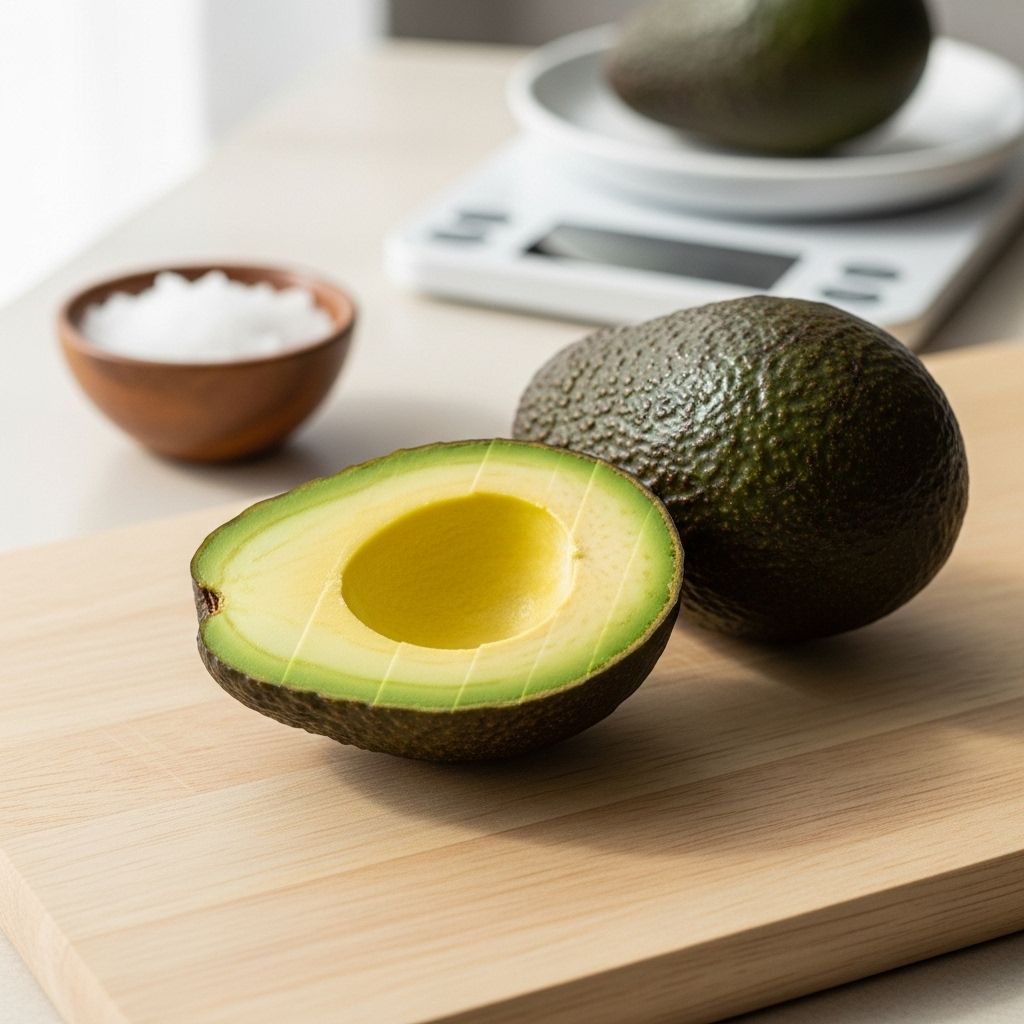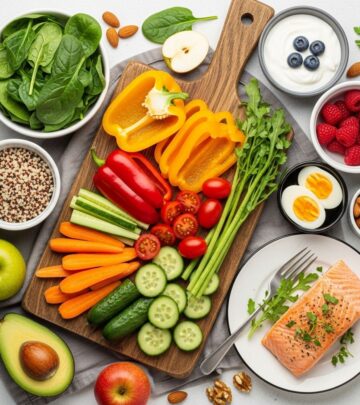Is It Safe to Eat Avocado Every Day? Nutritionists Weigh In
Portioning this creamy fruit can maximize benefits without tipping your calorie balance.

Avocados have soared in popularity, earning a reputation as one of the most versatile and beloved ingredients in modern cuisine. Whether mashed over toast, blended into smoothies, or turned into creamy guacamole, avocados deliver notable nutrition and a rich, creamy texture. But as their popularity grows, a key question remains: Is it actually safe or healthy to eat avocado every day? For those who crave the green fruit daily, here’s what experts and current research have to say.
What Are the Health Benefits of Eating Avocado?
Avocados are often celebrated as a nutrient powerhouse, and for good reason. This fruit is packed with essential vitamins, minerals, antioxidants, fiber, and healthy fats. Here’s a breakdown of the key nutrients and reasons avocados can be such a valuable addition to your diet:
- Healthy Fats: Avocados are rich in monounsaturated fats, particularly oleic acid. These fats are linked to improved heart health by lowering LDL (bad) cholesterol and increasing HDL (good) cholesterol levels.
- Fiber: One avocado provides roughly 10 grams of fiber, helping with digestion, promoting satiety, and potentially reducing cholesterol.
- Vitamins & Minerals: Significant quantities of potassium (which helps regulate blood pressure), folate (important for cell function), vitamins C and E (antioxidants), vitamin K, magnesium, and more.
- Plant Compounds: Avocados provide carotenoids such as lutein and zeaxanthin, which support eye health, and various phytochemicals with anti-inflammatory benefits.
- Low Glycemic Index: Their very low sugar content and low glycemic index make them a smart choice for those monitoring their blood sugar.
Together, this nutritional profile makes avocados beneficial for cardiovascular health, vision, and overall well-being.
Research on Daily Avocado Consumption
Nutritionists and researchers largely agree that, for most people, eating avocado daily is safe and can be part of a healthy diet. Several major studies help illustrate the benefits:
- A Harvard study found that people who ate the equivalent of one avocado per week had a 16% lower risk of cardiovascular disease and a 21% lower risk of coronary heart disease compared to those who didn’t eat avocados.
- Replacing half a serving of less healthy fats (such as butter or processed meats) with the same amount of avocado daily was linked to a 16–22% lower risk of heart disease.
- Recent evidence indicates that regular avocado eaters have a 20% lower risk of developing type 2 diabetes over a six-year period. For people with prediabetes, eating avocado before the study correlated with a 31% reduced risk of developing diabetes.
- HDL Cholesterol: Meta-analyses show that incorporating avocados can increase protective HDL cholesterol, especially in people consuming 1–3.7 avocados daily within certain dietary patterns.
However, most registered dietitians recommend one-half to one whole avocado per day as a practical, portion-controlled serving for most adults.
How Much Avocado Is Too Much?
While avocados have clear health advantages, there can be too much of a good thing. Eating avocados in excessive amounts may present several issues:
- High Caloric Density: Avocados are relatively high in calories—a whole standard Hass avocado contains about 240 calories. Overeating can contribute to unwanted weight gain if you aren’t mindful of overall caloric intake.
- Fat Content: Although the monounsaturated fats in avocados are healthy, they are still fats. Overconsumption could crowd out other important fat sources in your diet, reducing overall dietary diversity.
- Potassium: Avocados pack more potassium per serving than bananas. This is a benefit for most people but can pose risks if you have kidney issues or require a low-potassium diet.
Most nutritionists suggest limiting intake to about half to one whole avocado per day, adapting the portion size to your dietary needs, activity level, and health goals.
Who Should Avoid or Limit Daily Avocado Consumption?
For most healthy individuals, daily avocado consumption is safe and beneficial. However, some groups may need to moderate their intake or consult with a healthcare provider first:
- People with Kidney Issues: High potassium levels in avocados can be problematic for individuals with kidney disease, who may need to restrict potassium to avoid complications.
- Low-Fat/Low-Calorie Diets: Those under medical guidance to restrict fat or caloric intake for specific conditions should monitor avocado portions closely.
- Allergies: Rare but possible, avocado allergy can affect those sensitive to latex or certain fruit proteins.
How to Incorporate Avocado in a Balanced Diet
Because avocados are so nutrient-rich and versatile, they fit easily into a variety of meals and dietary patterns. For optimal health:
- Substitute avocado for butter or cheese on sandwiches, toast, or in wraps.
- Add sliced avocado to salads or grain bowls for a satisfying creaminess.
- Blend avocado into smoothies to increase creaminess and nutrition without added sugar.
- Use mashed avocado as a dip for vegetables, or mix it into dressings and sauces.
- Explore avocado in both savory and sweet dishes. Try avocado chocolate pudding or banana-avocado ice cream for dessert.
Common Mistakes to Avoid When Eating Avocado
To maximize the culinary and health benefits of avocados, watch out for these common pitfalls:
- Forgetting to Wash Before Slicing: Wash the skin thoroughly before cutting to minimize the risk of transferring surface bacteria from the skin to the edible part.
- Buying in Bulk Without a Plan: Only buy as many avocados as you can eat before they spoil—ripe avocados last only a few days at most at room temperature, and slightly longer in the fridge.
- Eating Too Many: Resist the urge to load up on several avocados a day—stick to the recommended serving size to avoid unnecessary calorie and fat intake.
- Assuming Avocados Are Only for Savory Foods: Expand your culinary repertoire and try avocados in sweet recipes! Their creamy texture is ideal for desserts.
How to Pick, Store, and Use Avocados
Proper handling assures the best flavor and longest shelf life for your avocados. Here’s what to keep in mind:
- Picking Avocados: Choose avocados that yield slightly to gentle pressure but are not mushy. Firm avocados will continue to ripen at room temperature.
- Storing Avocados: To slow ripening, refrigerate avocados. To accelerate ripening, place them in a paper bag with a banana or apple. Once cut, sprinkle exposed flesh with lemon or lime juice, cover tightly, and refrigerate to minimize browning.
- Using Overripe Avocados: If an avocado is overly soft but not spoiled, use it in smoothies, dressings, or baking to avoid food waste.
Comparing Avocados to Other Popular Healthy Fats
| Food | Main Fat Type | Key Nutrients | Common Uses |
|---|---|---|---|
| Avocado | Monounsaturated | Potassium, Fiber, Vitamins E/C | Salads, Toast, Smoothies, Dessert |
| Olive Oil | Monounsaturated | Vitamin E, Polyphenols | Dressing, Cooking, Dips |
| Nuts (e.g., Almonds) | Monounsaturated/Polyunsaturated | Protein, Fiber, Magnesium | Snacks, Baking, Toppings |
| Butter | Saturated | Vitamin A, Calcium | Cooking, Baking, Spreads |
Avocado Varieties: Is One Type Healthier?
There are over 500 different varieties of avocado, but the Hass avocado is the most widely available, known for its creamy flesh and small seed. Major nutritional differences between avocado varieties are minor, though shapes, sizes, and textures may vary. All can contribute significantly to a healthy diet if enjoyed in moderation.
Expert Tips for Including Avocado in Everyday Meals
- Experiment with avocado as a butter alternative in baking for a moist texture and added nutrients.
- Top tacos, grain bowls, or scrambled eggs with diced avocado for color and richness.
- Puree avocados into soups for a silky texture.
- Add to smoothies with greens and fruits for balanced creaminess and nutrition.
- Remember that avocado complements both spicy and sweet flavors—be creative in your pairings!
Frequently Asked Questions (FAQs) About Eating Avocado Every Day
Q: How many avocados can I safely eat in a day?
For most adults without specific medical restrictions, half to one avocado per day is a healthy serving. Those with higher calorie needs can enjoy slightly more, but moderation ensures maximum dietary benefit.
Q: Are there people who should avoid eating avocado daily?
People with kidney disease or potassium restrictions, those on very low-fat or low-calorie diets, and anyone with an avocado allergy should consult a doctor or dietitian before making avocados a daily staple.
Q: Can eating avocado every day help with weight loss?
Avocados promote satiety and can support weight loss if used to replace higher-calorie, less nutritious foods. Portion control remains important, as avocados are calorie-dense.
Q: What’s the best way to store cut avocados?
Cover the exposed flesh tightly with plastic wrap or in an airtight container, squeezed with lemon or lime juice to slow browning. Store in the refrigerator and consume within 1–2 days.
Q: Is it okay to eat avocados for breakfast every day?
Yes! Avocados are a smart addition to breakfast—on toast, in omelets, or smoothies—as long as overall diet variety and calorie intake are maintained.
Q: Are there potential side effects from eating too many avocados?
Side effects of overindulging include excessive caloric and fat intake, GI upset due to high fiber for sensitive individuals, and increased potassium—which can be risky for those with kidney problems.
Takeaway: Should You Eat Avocado Every Day?
Avocados offer substantial health benefits—from supporting heart health to supplying essential nutrients—when consumed as part of a balanced, varied diet. The key is moderation and being mindful of your body’s unique needs or any health conditions that could be impacted by increased fat or potassium intake. Replacing processed foods with avocado is a smart move for most people, but check serving sizes and consult with a registered dietitian if you have questions about your specific situation.
Quick Tips for Smart Avocado Consumption
- Wash avocados thoroughly, even if you don’t eat the skin.
- Buy only as many as you’ll consume within a few days to reduce waste.
- Try avocados in sweet as well as savory dishes for variety.
- Stick to one-half to one avocado daily for most nutritional benefit without excessive fat or calories.
By recognizing both the benefits and the potential pitfalls, you can confidently enjoy avocados every day as part of your healthy lifestyle.
References
- https://www.aol.com/safe-eat-avocado-every-day-092300689.html
- https://www.thedailymeal.com/1140766/mistakes-you-need-to-avoid-with-avocado/
- https://utswmed.org/medblog/avocado-a-day/
- https://www.goodhousekeeping.com/health/diet-nutrition/a47998/avocado-nutrition/
- https://www.goodhousekeeping.com/health/diet-nutrition/a64656683/study-ultraprocessed-foods-premature-death/
Read full bio of Sneha Tete












